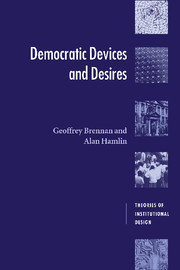10 - Political parties
Published online by Cambridge University Press: 22 September 2009
Summary
By a faction, I understand a number of citizens, whether amounting to a majority or a minority of the whole, who are united and actuated by some common impulse of passion, or of interest, adverse to the rights of other citizens, or to the permanent and aggregate interests of the community.
(Federalist papers, 10, James Madison)Political parties in public choice and political theory
Any satisfactory analysis of the practice of Western democracy – and any discussion of how it might be made to work better – must recognise and account for the role of political parties. That much seems self-evident. Indeed, for many people, to be political is to be party political. So, for example, much of the discussion, both popular and academic, of matters like alternative voting procedures – proportional representation, preferential (transferable) voting, compulsory voting and so on – is preoccupied with an investigation of how existing and potential political parties would fare under the various procedures. On this general view, to conceive of politics without parties is rather like conceiving of football without teams. Whatever such an activity would be exactly, it would certainly not be politics (or football) as we know it.
Yet parties as such have not received much attention in public choice analysis. It is generally noted that electoral candidates will have a party affiliation; and often, as in the early work by Downs, parties are identified as the contestants in the electoral process.
- Type
- Chapter
- Information
- Democratic Devices and Desires , pp. 185 - 210Publisher: Cambridge University PressPrint publication year: 2000

